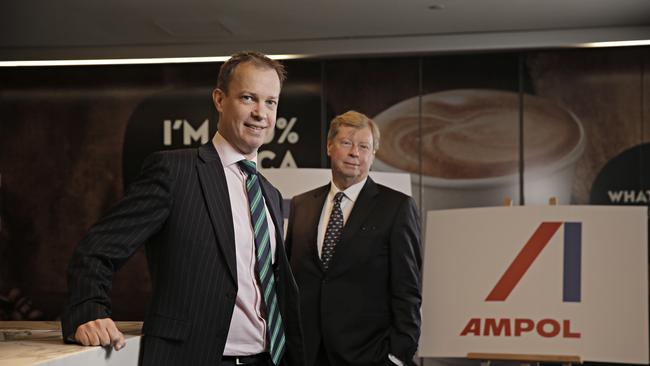Ampol ‘open to consolidation’
Fuels retailer Ampol has opened the door to potential consolidation among Australia’s four remaining refiners.

Fuels retailer Ampol has opened the door to potential consolidation among Australia’s four remaining refiners amid a tough outlook for the industry due to declining margins.
Record falls in fuel demand from COVID-19 have put fresh pressure on the refiners and raised the prospect of closures as owners grapple with losses at their facilities and ponder a $1bn bill to upgrade facilities to meet new fuel standards in coming years.
The Morrison government has kicked off a long-term strategic review of the nation’s refining industry which could see it offer support to ensure the sector remains operating, with consolidation also seen by analysts as a logical conclusion.
Ampol chief executive Matt Halliday, officially appointed to the role on Monday after a four month stint as interim boss, said he was open to a range of scenarios for its Lytton refinery in Brisbane, given the challenges facing the sector.
“We’re open to anything that enhances the returns on our asset base for our shareholders. When you look at refining, it is challenged and I think the objective we have is to ensure we’re operating those assets and to ensure they’re as efficient as possible, so co-operation and working together may well be an important part of that,” Mr Halliday said.
Three Australian refineries have shut since 2012 and the remaining plants now produce less than half of the country’s fuel needs, with the bulk of supplies imported from bigger facilities in Singapore, South Korea and Japan.
Ampol’s Lytton refinery is closed for extended maintenance while Viva Energy has cut petrol production from its Geelong refinery by half, reflecting falls in demand, with part of the facility shut down.
Both Ampol and Viva have indicated they would consider potential government support as one solution to help keep plants in operation as the nation emerges from the pandemic.
“Clearly we want to work closely with the government when they think about the role of domestic refining going forward. They acknowledge that there are very significant impacts that are challenging the refining sector at the moment and I think that’s a helpful recognition and we continue to have a conversation with them,” Mr Halliday said.
Margins will need to improve before Lytton could be reopened, the Ampol chief confirmed.
“It really comes down to the economic analysis as we get to the completion of the shutdown. Clearly conditions have been and remain very challenged,” Mr Halliday said.
“Ultimately it’s going to be an economic decision.”
The former Rio Tinto executive capped a rapid rise after only joining Ampol as chief financial officer in April 2019.
He replaces retiring chief Julian Segal and will be paid a $1.65m base salary along with short-term incentives capped at 70 per cent of his salary.
Ampol chairman Steven Gregg said it was the right time to make an appointment.
“Matthew has done an outstanding job as interim CEO through a period of unprecedented disruption and demand destruction following the onset of COVID-19, taking strong action to protect our assets and market-leading position, optimise cash flows and ensure the continued safe and reliable operation of our business for employees and customers,” Mr Gregg said.
Ampol, previously known as Caltex, rebranded after using the name under licence from US giant Chevron, which has re-entered the market through its Puma Energy acquisition.
The first Ampol sites will appear in Sydney and Melbourne in the second half of 2020 with a national rollout in 2021 and use of the Caltex name officially shelved by the end of 2022.




To join the conversation, please log in. Don't have an account? Register
Join the conversation, you are commenting as Logout